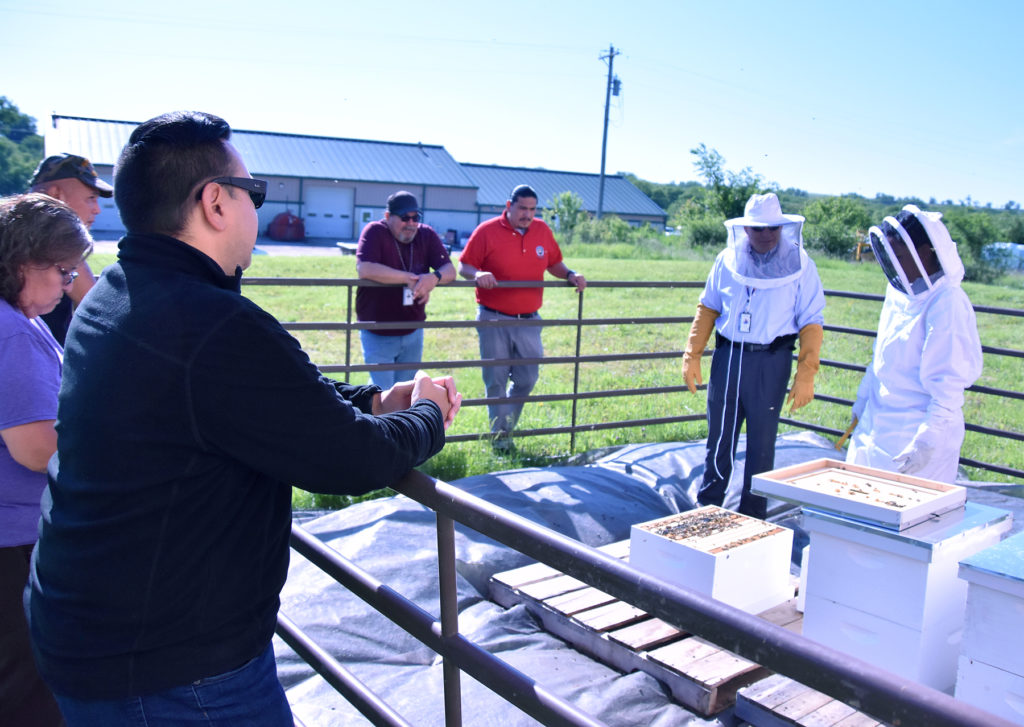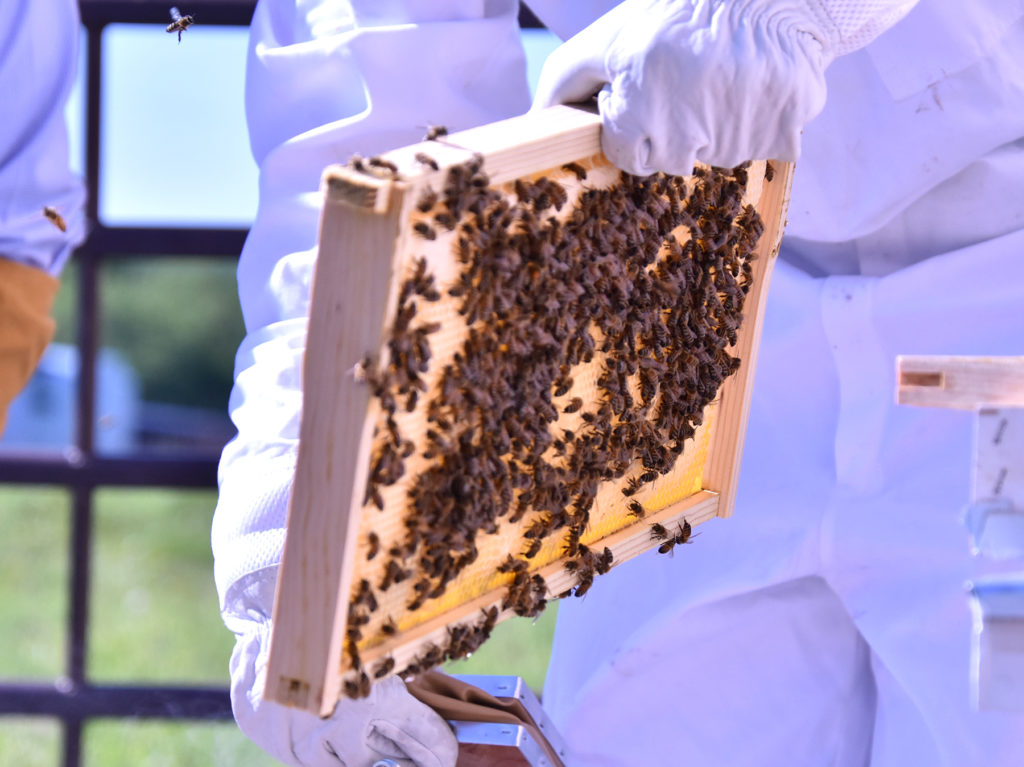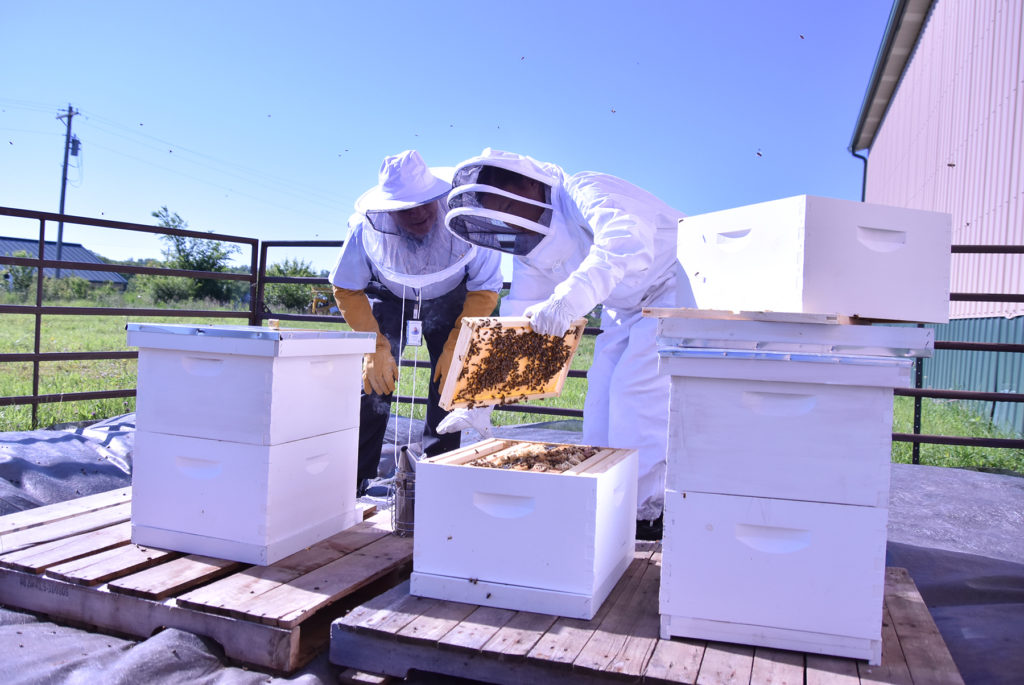
- Details
- By PBPN News
MAYETTA, Kan. — The Potawatomi Nation is known as the "Keepers of the Fire," and approximately three weeks ago the Prairie Band Potawatomi Nation (PBPN) became keepers of the bees. The PBPN Planning and Environmental Protection (PEP) program recently installed three brood boxes at the Land Maintenance complex, across the road from the Nation’s orchard located on K road. The new hives which each consist of roughly 10,000 bees are the tribe’s initial introduction to beekeeping. This new endeavor is off to a good start and it is anticipated that it will continue to grow and thrive and potentially become an economic resource in the future.
Virginia LeClere, PEP program Manager is leading the new bee initiative following a directive from the PBPN Tribal Council. LeClere and another PEP staff member, Chris Sims, attended Johnson County Community College (JCCC) Beekeeping I, II, and III, a 6-week training that prepares novice beekeepers on the ins and outs of bee maintenance prior to establishing the new colony. Staff plans to attend additional classes through JCCC in the fall to train on honey harvesting, wintering bees, and proper treatment of mites, moths, and diseases that can challenge healthy hives.
Along with the bees settling into their own community, a few members of the local Prairie Band community have also come forward to provide their hands-on knowledge regarding beekeeping. Food Distribution (Commodities) program manager Blake Garrison, Building Maintenance staff Kevin Throssell, and tribal member Richard Adame have all kept bees successfully and were happy to lend their expertise to the project.
The PBPN Tribal Council recognizes both the critical decline in the bee population and the essential impact bees make on the environment and felt now was an important time to include them as a component of the Nation’s resources.
Bees are vital pollinators with approximately 90 percent of all plants including trees requiring cross-pollination to flourish. Bees excel at helping plants grow, breed, and produce foods which furthers sustainable food systems for other insects, birds, animals and humans. The community is encouraged to respect the bees and their hives. Should anyone encounter a swarm, natural hive or brood boxes, do not disturb them.
Language Learning Tip: The Potawatomi word for bee is amo (äh-mō).
Editor's Note: This article was first published by the Prairie Band Potawatomi Nation News. Used with permission. All rights reserved.
More Stories Like This
Native News Weekly (August 25, 2024): D.C. BriefsNavajo Nation Mourns the Passing of Former Vice President Rex Lee Jim
Deb Haaland Earns Endorsement From Communications Workers of America Local 7076
University Soccer Standout Leads by Example
Two Native Americans Named to Democratic Congressional Campaign Committee's“Red to Blue” Program
Help us defend tribal sovereignty.
At Native News Online, our mission is rooted in telling the stories that strengthen sovereignty and uplift Indigenous voices — not just at year’s end, but every single day.
Because of your generosity last year, we were able to keep our reporters on the ground in tribal communities, at national gatherings and in the halls of Congress — covering the issues that matter most to Indian Country: sovereignty, culture, education, health and economic opportunity.
That support sustained us through a tough year in 2025. Now, as we look to the year ahead, we need your help right now to ensure warrior journalism remains strong — reporting that defends tribal sovereignty, amplifies Native truth, and holds power accountable.
 The stakes couldn't be higher. Your support keeps Native voices heard, Native stories told and Native sovereignty defended.
The stakes couldn't be higher. Your support keeps Native voices heard, Native stories told and Native sovereignty defended.
Stand with Warrior Journalism today.
Levi Rickert (Potawatomi), Editor & Publisher


